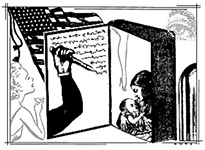Frank McCourt's 'Tis: A Memoir
Reviewed by Stacy Bush, Fri., Oct. 1, 1999
'Tis: A Memoir
by Frank McCourtScribner, $26 hard
Ye gods, what's a memoirist to do? How do you follow up a phenomenon like Angela's Ashes? Frank McCourt sat at the top of the bestseller list for the better part of two years. The reviews were universally sterling. He won the Pulitzer Prize. The paperback now graces spot number one on the paperback bestseller list. Nice work if you can get it.
The fact that some reviews of McCourt's "Tis vary widely (The New York Times' Michiko Kakutani hated the book's bitterness and envy, but Maureen Howard in the Sunday New York Times Book Review more than hinted she adored the book and compared McCourt to Sean O'Casey) illustrates that it has enough depth to provoke varied reactions and enough variety to engage a wide group of readers. No follow-up to Angela's Ashes was going to be easy. Say what you will: McCourt has guts and he uses them here.
'Tis begins where Angela's Ashes left off, with McCourt's arrival in America, and follows nearly 20 years of toil, camaraderie, army duties, romantic woes and triumphs, teaching, childbirth, and death. It is the definitive sequel to Angela's Ashes because we learn the meaning of the previous book's title, and the deaths of both parents, pivotal characters in that earlier memoir, occur in this book. This offers the reader as well as the writer a kind of closure that is necessary and welcome. Now we can connect the dots.
The tone of 'Tis is quite different from Angela's Ashes, and thank goodness for that. While it may be a shock to read the numerous complaints, self-deprecations, and envious moments McCourt experiences, his honesty is refreshing. A child cannot compare his experience to others as well as an adult. The child believes his experience is the universal one. Not so with the adult. When McCourt describes how disgruntled he is cleaning up after rich college students at the Biltmore Hotel and expands on his yearning for a college education, one realizes how easy it is to take life for granted. Fortunately, humor goes hand in hand with these stories, and the reader knows that McCourt has moved beyond the powerlessness and envy he felt in those days. It takes a lifetime to uproot what your upbringing has sodded into you.
McCourt should also be praised for knowing when to pull back on the emotional strings. The demise of his marriage and the deaths and funerals of his parents are told without pathos, clean and honest. The travails of his mother in America are not glossed over; lonely and querulous, Angela was homesick till the day of her death. She never thanked her sons for what they had given her (perhaps she could not). But McCourt does not make his feelings about their relationship unrealistically noble. He has the nerve to write what he felt. This makes the difference between a real writer and a merely good storyteller.
At the end of 'Tis, a reader might find it unbelievable that McCourt has compressed so much life into a little over 350 pages. You miss his voice once the book has been completed. Fortunately, McCourt seems to have no intentions of doing a literary Garbo act. He'll be back with something new and different. Reading a natural like McCourt makes one suspect that the reader has the more difficult task, though; we have to wait for McCourt's next entry.










